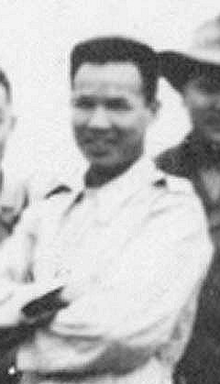Pham Van Son
| Phạm Văn Đồng | |
|---|---|

Phạm Văn Đồng as a Lt. Colonel, 1953
|
|
| Nickname(s) | Tiger of the Delta |
| Born |
October 25, 1919 Sơn Tây, North Vietnam |
| Died | November 26, 2008 (aged 89) Philadelphia, USA |
| Buried at | Fairfax Memorial Park, Fairfax, Virginia, USA |
| Allegiance |
|
| Service/branch | AFRVN Infantry, (Lục Quân Quân-lực VNCH) |
| Years of service | 1939–1967 |
| Rank |
|
| Commands held | Zône Sud, North Vietnam 55th BVN 2nd Mobile Group Bui Chu Secteur North Vietnam Light Battalions and Artillery Forces Quang-Yen NCO Academy Coastal Zone 3rd Field Division III Corps – Deputy Commander 7th Division Special Capital Military District Saigon-Giadinh Military Governorship |
| Battles/wars | World War II First Indochina War Vietnam War |
| Awards |
Order of the Dragon of Annam, Officer National Order, Commander Cross of Gallantry, 18 citations |
| Other work | Minister of War Veterans (1969–1974) |
Phạm Văn Đồng (![]() listen; 1919–2008) was a Vietnamese general. In 1965, as military governor of Saigon, he had successfully repressed Buddhist mobs instigated by Thích Trí Quang of the Ấn Quang group and Thích Tâm Châu of Việt Nam Quốc Tự. With his commanding skills and knowledge, Đồng was regarded highly by American and French officers, and well respected by many ARVN officers. A staunch nationalist and anti-communist, he was considered an ally to the labor union, the Northern Catholics, several Việt Nam Quốc Dân Đảng (Việt Quốc) factions, multiple Đại Việt groups, Việt Nam Cách Mạng Đồng Minh Hội (Việt Cách) high-ranking members, Duy Dân and Hòa Hảo leaders.
listen; 1919–2008) was a Vietnamese general. In 1965, as military governor of Saigon, he had successfully repressed Buddhist mobs instigated by Thích Trí Quang of the Ấn Quang group and Thích Tâm Châu of Việt Nam Quốc Tự. With his commanding skills and knowledge, Đồng was regarded highly by American and French officers, and well respected by many ARVN officers. A staunch nationalist and anti-communist, he was considered an ally to the labor union, the Northern Catholics, several Việt Nam Quốc Dân Đảng (Việt Quốc) factions, multiple Đại Việt groups, Việt Nam Cách Mạng Đồng Minh Hội (Việt Cách) high-ranking members, Duy Dân and Hòa Hảo leaders.
Phạm Văn Đồng (who has the same name the former Prime Minister of North Vietnam) was born October 25, 1919, in Quốc Oai district, Sơn Tây, Tonkin (now North Vietnam), when Vietnam was still part of French Indochina. He grew up in his father's village of Xuân Đỗ, Gia Lâm district (then part of Bắc Ninh Province) and went to school in Hà Nội where he earned the "Thành Chung" (Diplôme d'Etudes Primaires Superieures Indochinoises (DEPSI)) upon his graduation from Đỗ Hữu Vị School.
...
Wikipedia
